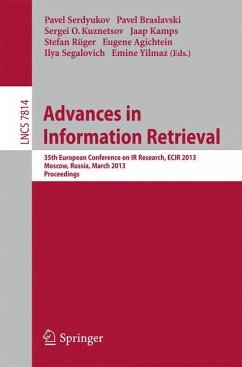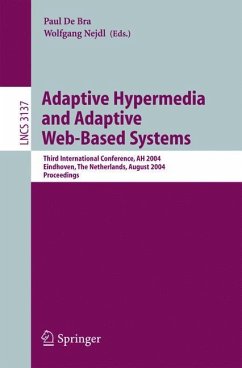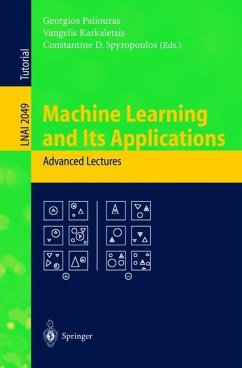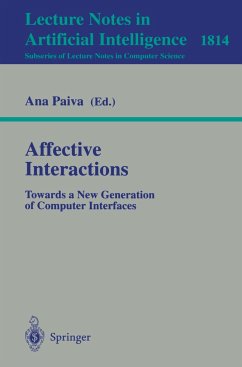
Adaptive Hypertext and Hypermedia
Versandkostenfrei!
Versandfertig in 6-10 Tagen
76,99 €
inkl. MwSt.

PAYBACK Punkte
38 °P sammeln!
Hypertext/hypermedia systems and user-model-based adaptive systems in the areas of learning and information retrieval have for a long time been considered as two mutually exclusive approaches to information access. Adaptive systems tailor information to the user and may guide the user in the information space to present the most relevant material, taking into account a model of the user's goals, interests and preferences. Hypermedia systems, on the other hand, are `user neutral': they provide the user with the tools and the freedom to explore an information space by browsing through a complex ...
Hypertext/hypermedia systems and user-model-based adaptive systems in the areas of learning and information retrieval have for a long time been considered as two mutually exclusive approaches to information access. Adaptive systems tailor information to the user and may guide the user in the information space to present the most relevant material, taking into account a model of the user's goals, interests and preferences. Hypermedia systems, on the other hand, are `user neutral': they provide the user with the tools and the freedom to explore an information space by browsing through a complex network of information nodes. Adaptive hypertext and hypermedia systems attempt to bridge the gap between these two approaches.
Adaptation of hypermedia systems to each individual user is increasingly needed. With the growing size, complexity and heterogeneity of current hypermedia systems, such as the World Wide Web, it becomes virtually impossible to impose guidelines onauthors concerning the overall organization of hypermedia information. The networks therefore become so complex and unstructured that the existing navigational tools are no longer powerful enough to provide orientation on where to search for the needed information. It is also not possible to identify appropriate pre-defined paths or subnets for users with certain goals and knowledge backgrounds since the user community of hypermedia systems is usually quite inhomogeneous. This is particularly true for Web-based applications which are expected to be used by a much greater variety of users than any earlier standalone application.
A possible remedy for the negative effects of the traditional `one-size-fits-all' approach in the development of hypermedia systems is to equip them with the ability to adapt to the needs of their individual users. A possible way of achieving adaptivity is by modeling the users and tailoring the system's interactions to theirgoals, tasks and interests. In this sense, the notion of adaptive hypertext/hypermedia comes naturally to denote a hypertext or hypermedia system which reflects some features of the user and/or characteristics of his system usage in a user model, and utilizes this model in order to adapt various behavioral aspects of the system to the user.
This book is the first comprehensive publication on adaptive hypertext and hypermedia. It is oriented towards researchers and practitioners in the fields of hypertext and hypermedia, information systems, and personalized systems. It is also an important resource for the numerous developers of Web-based applications. The design decisions, adaptation methods, and experience presented in this book are a unique source of ideas and techniques for developing more usable and more intelligent Web-based systems suitable for a great variety of users. The practitioners will find it important that many of the adaptation techniques presented in this book have proved to be efficient and are ready to be used in various applications.
Adaptation of hypermedia systems to each individual user is increasingly needed. With the growing size, complexity and heterogeneity of current hypermedia systems, such as the World Wide Web, it becomes virtually impossible to impose guidelines onauthors concerning the overall organization of hypermedia information. The networks therefore become so complex and unstructured that the existing navigational tools are no longer powerful enough to provide orientation on where to search for the needed information. It is also not possible to identify appropriate pre-defined paths or subnets for users with certain goals and knowledge backgrounds since the user community of hypermedia systems is usually quite inhomogeneous. This is particularly true for Web-based applications which are expected to be used by a much greater variety of users than any earlier standalone application.
A possible remedy for the negative effects of the traditional `one-size-fits-all' approach in the development of hypermedia systems is to equip them with the ability to adapt to the needs of their individual users. A possible way of achieving adaptivity is by modeling the users and tailoring the system's interactions to theirgoals, tasks and interests. In this sense, the notion of adaptive hypertext/hypermedia comes naturally to denote a hypertext or hypermedia system which reflects some features of the user and/or characteristics of his system usage in a user model, and utilizes this model in order to adapt various behavioral aspects of the system to the user.
This book is the first comprehensive publication on adaptive hypertext and hypermedia. It is oriented towards researchers and practitioners in the fields of hypertext and hypermedia, information systems, and personalized systems. It is also an important resource for the numerous developers of Web-based applications. The design decisions, adaptation methods, and experience presented in this book are a unique source of ideas and techniques for developing more usable and more intelligent Web-based systems suitable for a great variety of users. The practitioners will find it important that many of the adaptation techniques presented in this book have proved to be efficient and are ready to be used in various applications.














